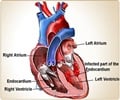
Garvan C. Kane, M.D., Ph.D., of the Mayo Clinic and Medical School, Rochester, Minn., and colleagues conducted a study to measure changes in diastolic function over time and to determine the relationship between diastolic dysfunction and the risk of subsequent heart failure. The study included participants enrolled in the Olmsted County Heart Function Study (OCHFS). Randomly selected participants 45 years or older (n = 2,042) underwent clinical evaluation, medical record abstraction, and echocardiography (examination 1 [1997-2000]). Diastolic left ventricular function was graded as normal, mild, moderate, or severe via testing. After 4 years, participants were invited to return for examination 2 (2001-2004). The group of participants returning for examination 2 (n = 1,402 of 1,960 surviving [72 percent]) then underwent follow-up testing for determination of new-onset heart failure (2004-2010).
The researchers found that from examination 1 to examination 2, the prevalence of diastolic dysfunction of any degree increased from 23.8 percent to 39.2 percent. Moderate or severe diastolic dysfunction increased from 6.4 percent to 16.0 percent. Over 4 years, 23.4 percent of participants experienced worsening of diastolic function, 67.8 percent remained unchanged, and 8.8 percent experienced improved diastolic function. Age was predictive of the development of diastolic dysfunction, especially ages 65 years or older.
In the analysis of the diastolic function of healthy participants (without hypertension, diabetes, coronary artery disease, heart failure, or use of cardiovascular medications), incidence of diastolic dysfunction of any degree increased from 11.3 percent at examination 1 to 29.8 percent at examination 2. Among 423 healthy participants, 19.9 percent showed worsening diastolic function, 75.2 percent remained the same, and 5.0 percent improved.
During 6.3 years of additional follow-up, 81 participants developed heart failure. Age 65 years or older was the strongest predictor of heart failure. The authors found that persistent or worsening diastolic dysfunction was associated with heart failure. "Cumulative heart failure incidence was 2.6 percent in participants whose diastolic function remained normal or normalized between examinations; 7.8 percent in those with persistent, or progression to mild diastolic dysfunction; and 12.2 percent in those with persistent, or progression to moderate or severe diastolic dysfunction."
"Longitudinal evaluation of participants in the population-based OCHFS cohort reveals that left ventricular diastolic dysfunction is highly prevalent, tends to worsen over time, and is associated with advancing age. Worsening diastolic function can be detected even in apparently healthy persons. Although confirmation in other studies would be helpful, our data suggest that persistence or progression of diastolic dysfunction is a risk factor for heart failure in elderly persons," the researchers conclude.
Advertisement















